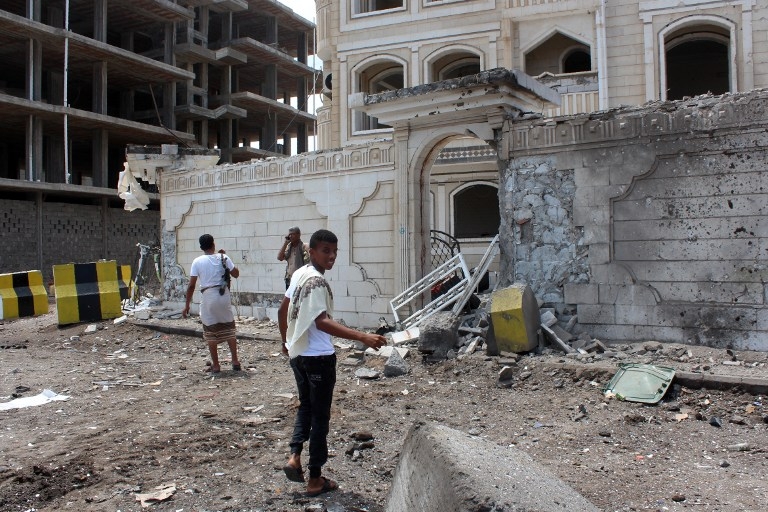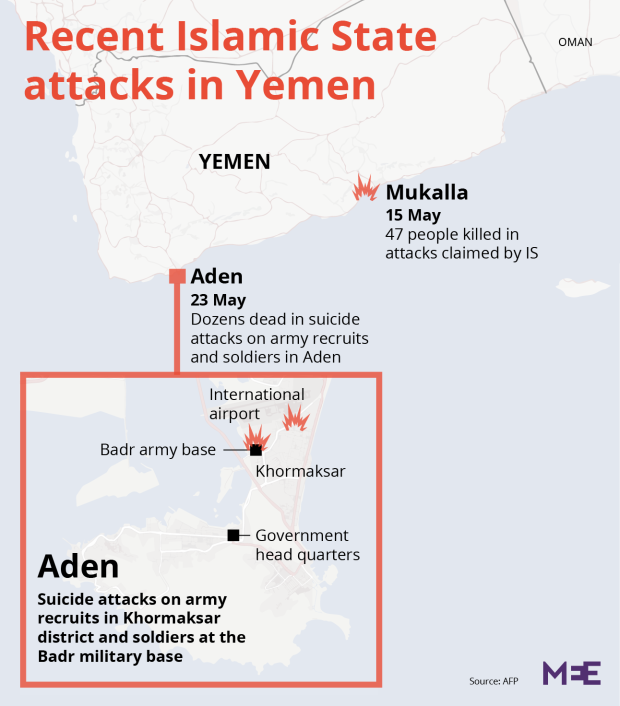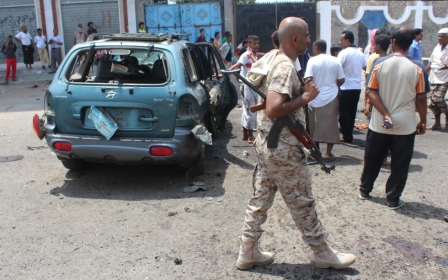Militants still wreak death and destruction on south Yemen despite victories

AL-MUKALLA, Yemen – In this coastal city in Yemen’s largest province, Hadramout, the scene at Ibn Cina hospital was harrowing as dozens of bloodied bodies and critically injured police recruits arrived on motorbikes and in vans, taxis and ambulances.
The victims had been standing in line outside a security compound when a man wearing an explosive belt detonated it.
At the hospital, grieved relatives arrived in droves and waited on tenterhooks in the yard for news. Women began to ululate as they heard of the deaths of their relatives.
The suicide bombing on 15 May killed 25 and wounded more than 50 others. The local branch of the Islamic State (IS) group took credit for the attack and vowed to conduct more.
Even though thousands of government forces in conjunction with military air support from the Saudi-led coalition re-took this city from al-Qaeda in late April, peace has been inconsistent at best. Since the attack, security officers have killed 13 militants suspected of belonging to the group.
The recent attacks have raised fears among residents and observers that despite military victories, security continues to be a problem.
Roughly 750km south of Mukalla, the strategic port city of Aden is also experiencing a security vacuum.Failing to take note of the previous attack, on 23 May a man wearing explosive materials made his way into an area where army recruits had gathered outside the house of a military commander. He set off his belt, killing 40 people and wounding 60.
In the wake of a sequence of deadly attacks by IS and al-Qaeda in both Aden and Mukalla, many observers fear that government does not have the ability to defeat both organisations, but according to some interviewed by MEE, progress towards security and stability has been made.
Considerable improvement
Ayat Hussein, an aid worker from Aden, said a recent army crackdown and raids on armed groups have been successful and that the quality of life has improved.
“In the past, al-Qaeda religious police used to harass us on the coasts by asking women to keep a distance from men. If we did not listen they shot live bullets in the air to frighten us,” she told MEE.
In early March, pro-government forces began retaking al-Qaeda and IS hideouts. Ayat said assassinations and bombings had slowed since government forces recaptured al-Mansoura.
“It has been 10 days since I heard about an explosion or assassination. These attacks are a natural aftermath of the war.”
Underemphasised threat
Brigadier Nasser al-Anbouri, commander of Special Security Forces in Aden, Lahj and Abyan, whose forces are involved in anti-militant raids, told MEE that he sees no difference between al-Qaeda and IS.
“Al-Qaeda and IS are two sides of one coin. Both are similarly carrying out terrorist attacks,” he said.
After taking control of militant sanctuaries in Aden, coalition-trained forces moved towards the neighbouring provinces and managed in April to boot the militants out of Lahj province. But as the government forces have expanded, IS has stepped up its deadly attacks in Aden.
“Those suicide bombers spring up like a flash. We assume that there are some elements in hiding, but they are weak and dispersed,” al-Anbouri said.
However, despite officials’ assurances about the security situation in Aden, some residents say security forces are not capable of ridding the area of militants.
“They do not have modern machines for detecting explosive materials.” Mustafa, a young man from Aden, told MEE.
But he agreed that threats from al-Qaeda and IS have been shrinking since government forces recaptured al-Mansoura from al-Qaeda.
Dubious organisations
Despite bloody attacks on security forces in the city, analysts have raised doubts about whether there is a real branch of IS in Yemen. Unlike the well-established al-Qaeda, which has well-known leaders and controls territory, IS has no visible presence on the ground, said Fatehi Bin Lazreg, editor of Aden al-Ghad newspaper.
“This supports allegations that there is no actual IS in Yemen, rather a secret cell linked to foreign intelligence bodies,” he said. Lazreg also said that the dubious local IS could simply be the “brutal” face of al-Qaeda.
“Most IS attacks take place when al-Qaeda suffers defeats,” he said.
The Islamic State in Yemen, however, consists of small, localised cells without any coherent or unified goals, he added.
For months, al-Qaeda in the Arabian Peninsula controlled large swathes of land in the south as government forces battled the rebellious Shia Houthis. The militants lost much of their territory to army assaults or successful tribal mediation that granted them a safe exit.
“Al-Qaeda has lost much of its support in the south after the fall of [former president Ali Abdullah] Saleh’s regime and the departure of his forces. Al-Qaeda used to exploit local resentment from northerners to attack the army. Now army forces are locals,” Lazreg said.
New MEE newsletter: Jerusalem Dispatch
Sign up to get the latest insights and analysis on Israel-Palestine, alongside Turkey Unpacked and other MEE newsletters
Middle East Eye delivers independent and unrivalled coverage and analysis of the Middle East, North Africa and beyond. To learn more about republishing this content and the associated fees, please fill out this form. More about MEE can be found here.





